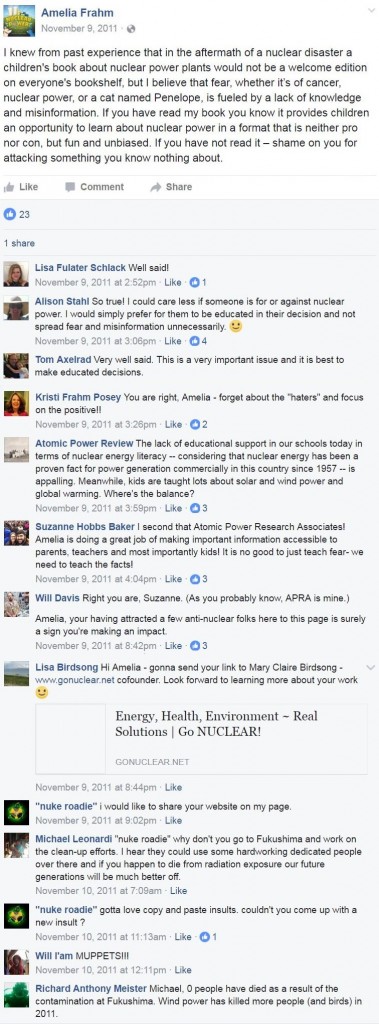Why I will "March for Science"
Nukie Nuclear Power Plant has issued a SCRAM alert and an emergency shutdown has been declared due to a mandatory employee science march.
This is not a fake news story, but my sitcom-of-a-real life as the author of a children's picture book about nuclear power plants, and why I'm crawling out from under the proverbial (uranium) rock I've been hiding under to March for Science on Earth Day, Saturday, April 22.
In case you don't know me, I'm Amelia Frahm. I am a disgusting example of motherhood, or as I refer to myself, a writer, educator, and cancer survivor who wrote the children's picture book Nuclear Power: How a NuclearPower Plant Really Works!
As a fiction writer of factual topics, the best way to authenticate anything I write about-or what critics might taunt me about-is by supplying factual information from experts in the sciences.
In the aftermath of the 2011 Fukushima nuclear disaster, I released a children's book I hoped would incite the curiosity of children, who like me, were not technically inclined. It was intended as a resource to explain the basic operation of a nuclear power plant. If there was ever a time that children might need an explanation about how nuclear power plants operate, I thought post-Fukushima would be it.
Instead the book was called nuclear propaganda for children. I was called everything from morally bankrupt to an unfit mother, and one person went so far as to call me a nuclear pedophile. I was proclaimed a sick, confused, cancer victim (not survivor) who should be ashamed of herself for promoting the very thing that caused her cancer. My reputation as an author -and even mother-was smeared by people who literally did judge a book by its cover and would choose censorship over education.

Supportive comments from the nuke community & one example from anti-nukes.
I felt nauseous reading comments like:
"I've taught my kids to be scared witless of nuclear power!"
"You cannot be serious! How evil are you?"
"...disgusting example of motherhood."
It was the STEM community who defended me. They pointed out that disagreeing with an issue is not a reason to censor the topic, but rather the reason it should be studied. My defenders were tough, articulate, and seasoned nuclear professionals to whom I will be forever grateful. I was unprepared for the hatefulness exhibited by grown-ups who called for the censoring of a children's book based on its title and topic.
I soon discovered that the very credentials that made my STEM colleagues knowledgeable about nuclear power plants were the very same ones that were pointed at with disdain and used as a means to provoke suspicion by people who disagreed with them.
These tactics are especially effectual when the boring truth is just not as captivating as attention-seeking, inflammatory sound bites like this one directed at me:
"Once you're done convincing your kids that nuclear power is totally safe you can buy her other book to explain the unfortunate cancer it gave them!"
I understand why people would look at a nuclear power plant and be scared witless in the aftermath of the Fukushima disaster. I feel the same way every time a plane crashes, despite the fact that I once worked as a flight attendant.
What I cannot stand (and crawled out from under my uranium rock to help prevent) is using fear to censor science. Especially when factual information provided by scientific research, or even a contentious children's picture book, could potentially lessen those fears.
When you give a child a lesson plan or a picture book, often the parent learns something as well. That is a problem for people whose opinions are based on alternative facts. They feel compelled to denounce what they know nothing about.
Look, most of us do want the same things, like a healthy earth and better future for our children, we just disagree about how to achieve them. Provided we don't silence it, science will tell us which direction to march. Those of us participating in the March for Science believe that direction is forward!

-3 2x1.jpg)